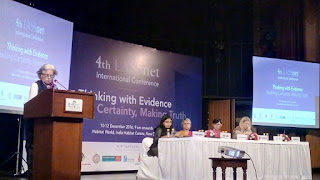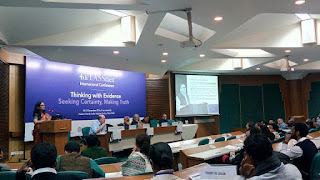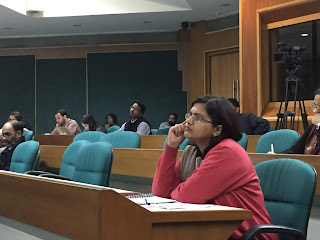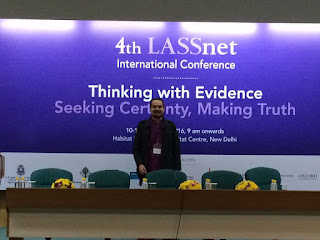12/15/16
12/14/16
The launch of the Indian Law Review at LASS 2016: Call for Papers
Routledge, Taylor & Francis
is delighted to announce the launch the Indian Law Review. Edited
by a global team of exceptional
scholars, we are excited to be publishing the first volume in 2017. Authors
are now welcome to submit
manuscripts. The Indian Law Review, seeking to build upon LASSNET's successes over the last decade, is an academic - led, double- blind
peer-reviewed, generalist journal on Indian Law. It aims:
·
to publish top quality scholarship on Indian law
spanning all areas of law including comparative perspectives that include
Indian Law.
·
to offer a forum for the community of scholars
of Indian Law both within and outside India.
·
to take a broad interdisciplinary approach to
the study of Indian Law, thereby reaching a wide readership, including legal
academics, philosophers, criminologists, anthropologists, sociologists,
historians, political scientists, legal practitioners and others.
The Indian Law Review's scope is broad, and extends to all work
relevant to Indian law (including comparative perspectives). The journal is not
limited in terms of legal themes or methodology; the only limitation is
jurisdictional, and submissions are welcome from scholars located worldwide. Indian Law Review may also publish a
small number of high quality pieces relating to the law of other South Asian
and Southeast Asian jurisdictions with historical and geographical connections
to India.
The Indian Law Review publishes three issues per year. Each issue aims
to contain three to five articles, one to three book reviews, a literature
review, and notes on recent case and statutes. Its editorial policy requires
anonymised submissions, and strictly follows double-blind peer review.
Indian Law Review is
accepting submissions
The Indian Law Review uses
Editorial Manager to manage the submission and peer review process, and is now
accepting submissions for articles, literature reviews, case notes, legislative
notes, and book reviews. To submit your manuscript please visit the Journal’s submission page. For information on preparing
your submission please visit the Instructions
for Authors page.
LASS in LiveLaw
http://www.livelaw.in/law-not-monopoly-legal-experts-alone-say-pratiksha-baxi-siddharth-narrain-organisers-4th-international-lassnet-conference-new-delhi/
http://www.livelaw.in/experts-assail-sentencing-policy-india/
http://www.livelaw.in/demonetisation-brought-legal-culpability-rbi-scrutiny-says-chirashree-das-gupta-academic-author/
http://www.livelaw.in/experts-assail-sentencing-policy-india/
http://www.livelaw.in/demonetisation-brought-legal-culpability-rbi-scrutiny-says-chirashree-das-gupta-academic-author/
Fourth Edition of LASSnet Conference 2016, 'Thinking With Evidence: Seeking Certainty, Making Truth'
The only conference of its kind in South Asia, the fourth edition of the Law and Social Sciences Research Network (LASSnet) took place from 10-12 December 2016 in Delhi.
LASSnet is a virtual network anchored at the Centre for the Study of Law and Governance, Jawaharlal Nehru University. LASSnet was established in order to bring together scholars, lawyers and doctoral researchers engaged in research and teaching of issues of law in different social sciences in contemporary South Asia in 2007.
The fourth edition of the LASSnet conference was organised by the Centre for the Study of Law and Governance, Jindal Global Law School of O.P. Jindal Global University, National Law University Delhi, Azim Premji University, Ambedkar University Delhi, the Indian Institute of Technology Delhi, and the Dickson Pool Transnational Law Institute at the King’s College, London. These institutions have been at the forefront of interdisciplinary research on law and have engaged with the role of law in the making of contemporary South Asia. More than 500 participants from all over the world attended the conference of over 60 sessions, and three featured panels engaged with what it means to think with ‘evidence’ in law and outside law.
Evidence has increasingly become an important category in our everyday lives, be it in the familial, political, or historical domain. The contested nature of evidence in law and life found animated debate at the conference. The theme of this conference, ‘Thinking with Evidence: Seeking Certainty, Making Truth’ pertains to the question of evidence and its role in legal and social research. For initiatives such as LASSnet, the imperative of thinking with evidence – in these times of virtual virality, forensic imaginaries and ephemeral archives – serves as a fertile ground on which we can stage discussions of the perils, pleasures, meanings and methods of inter-disciplinarity. ‘Thinking with Evidence’ allows engaging the possibilities of legal and social world, and how they invite discussions on our changing world and possible futures.
The conference was graced by many luminaries including C Raj Kumar, Ranbir Singh, Shyam Menon, Sudhir Krishnaswamy, Niraja Jayal, Julia Eckert, Ravinder Kaur, Vrinda Grover, Rebecca John, Peer Zumbassen, Shirin Rai, Lawrence Liang, Kalpana Kannabiran, Tarunabh Khaitan, Jawahar Raja, Abhinav Chandrachud, Shalini Randeria and Shireen Hassim.
LASSnet has highlighted the fact that although the domain of law has primarily been either a site of legal practice or of scholarship by lawyers alone, the emergence of LASSnet demonstrates how exciting and important it is to have conversations about law and justice from a range of disciplines. Scholarship in the field of law has grown to encompass a wide array of disciplines, methodologies, political perspectives and conceptual overlaps. If the initial movement was predominantly led by sociologists and then by scholars of literary studies, it now includes an ever expanding terrain of social science and humanities disciplines, including anthropology, digital studies, film and history. LASSnet has always seen law as an immensely fertile site to examine the social, the historical and the political. Previous LASSnet conferences were held in 2009, 2010 and 2012 at the Jawaharlal Nehru University (JNU), the Foundation for Liberal and Management Education (FLAME) in Pune and at the Department of Law, University of Peradeniya, Sri Lanka.
The opening talk at the 2016 conference was delivered by the eminent political theorist from Yale University, with Professors Shiv Visvanathan, Ramin Jahenbegloo, and Gitanjali Surendran on Gandhi’s ideas on non-violence. The closing contemplated the evidence of hope by crafting a discussion between the eminent legal scholars Indira Jaising, Babloo Loitongbam, Usha Ramanathan, Upendra Baxi, and Julia Eckert.
Three memorial panels were organised to recognise the contribution of the work and lives of three young academics, all of whom passed away in 2015. The panel dedicated to Dwijen Rangnekar marked his pathbreaking work in the field of geographical indicators. Another panel remembered Priya Thangarajah, a young Sri Lankan lawyer and researcher who made invaluable contributions to deepening our understanding of law and violence in times of conflict. And finally tribute was paid to U.S. based Pakistani scholar late Nasser Hussain whose work on law and emergency remains one of the most important contributions to the field in the region. The three panels engaged with the work of these scholars as a way of acknowledging their deep learning across histories, borders, disciplines and friendships.
The conference witnessed discussions around six books by emerging scholars from the LASSnet community on themes ranging from public interest litigation in India to debates around sentencing in criminal cases. One of the panels focused on a discussion around law and disability following the recent release of The India Social Development Report. The Indian Law Review, an academic journal on Indian law, was launched at the conference, also a product of the conversations at LASSnet over a decade. A syllabus workshop designed between King’s College London and O.P. Jindal Global Law School was held where mid-career teachers were invited to submit a syllabus of their own design for feedback and discussion.
2/1/16
Deadline for Submitting Panels and Individual Abstracts for LASS2016 Conference has been extended to 1 MARCH 2016.
LASSnet Conference- 10-12 December 2016
‘Thinking with Evidence: Seeking Certainty, Making Truth’.
The indeterminacy in law could be read both as a problem of truth and also as one that plagues disciplines. The question of evidence has been central to the formation of disciplines and the claims that they make upon knowledge. For initiatives such as LASSnet, the imperative of thinking with evidence — in these times of virtual virality, forensic imaginaries and ephemeral archives — serves as a fertile ground on which we can stage discussions of the perils, pleasures, meanings and methods of inter-disciplinarity. While disciplines are defined partially by the evidentiary protocols that they follow, the very nature of inter-disciplinary enquiry calls into crisis the idea of a single protocol. The methodological concerns with the seeking and making of certainty and truth implicate a whole range of disciplines: anthropology, art, history, law, religion, philosophy, politics, economics, literature, theatre, and science, to name just a few. The stakes in thinking with evidence are very high since doing so raises the core epistemological claims, regarding not just of what, but also how we know. This is rendered all the more difficult because the very grounds of evidence are themselves shifting terrain, subject not only to developments in science and technology but also to forms of historical consciousness and social knowledge.
Thinking with evidence in engaging the encounters and intimacies between the imaginations of the legal and the social can provoke interdisciplinary conversations, in the affective and corporeal works and worlds of making, seeking and living with truth. Such an engagement offers an invitation to re-invigorate discussions around the dialectic of the abstract and the concrete of jurisdiction, procedure and techné.
How does evidence index intelligibility and illegibility simultaneously on bodies and things? How are questions of inheritance and memory mediated through a claim to the evidentiary? How may one think of ways of doing politics and living with law? Or address questions of responsibility and conduct, particularly as these arise in the context of experience, acting as evidence of legitimate speech?
The English word ‘evidence’ is associated with Latin verb, vidier, to see. The relationship between seeing, believing and knowing, when mediated by visual technologies, transforms ways of seeking certainity and making truth. Along with criminal law, procedural and constitutional law also offer fertile grounds to think of evidence as an object of truth and power. In our technologized regimes that are heavily invested in the forensic fascination with truth detection, how do we think of the constitutional implications of scientific evidence and the truth claims that they make?
Moreover, why is the ocular or aural privileged over the haptic or olfactory? How do we furnish evidence of experiences of humiliation when ocular or aural techniques of knowing and telling make suffering illegible in the legal languages of evidence? Moving our gaze to the gamut of categories that populate ‘evidence law’ we ask following William Twining: “how to do things with evidence?” Is it a legal fiction that there are evidentiary rules that determine probability, presumption, fact, proof and certainty, classifying some artefacts as facts or truths and others as exaggerations, falsehoods or myths? How is the process of making juridical facts, legal certainties and presumptions embedded in continuities and changes in social relations in history, economy, culture and politics? How does the production and circulation of technologies of evidence in popular culture create demands for scientific evidence in actual trials?
What kind of commodity is evidence? What kinds of technologies are deployed to evidence the body in law? What kinds of knowledges congeal in the category of expert evidence, from archealogy to forensics, to act upon languages of social suffering? What is the nature of the testimony that underlies expert evidence in law and literature? Do concepts of evidence in visual arts and performing arts speak to juridical notions of evidence, testimony and witnessing?
How may we understand what we do with evidence when we turn to religion, or custom; or state and non-state law? Drawing on the vast critical literature on Hindu or Islamic law; or customary and indigenous law in colonial, post-colonial and settler-colonial contexts, how may one think of evidence as it mediates between law and justice in relation to the claims of truth to power? How are notions of evidence in these traditions, or in traditions of aurality/orality, constituted by the theories of codified visuality in common law traditions? Further, what kinds of evidence does the discourse on plurality, secularism and rights rely upon?
Why do certain kinds of evidence of suffering falter, while other kinds of evidence succeed in making suffering visible? How do we think of evidence in a broad sense—as not just documents, facts, proof, or expert knowledge but also as "aesthetics of protests'', as truths that counter the processes by which evidence is constructed in the context of of displacement, gender violence, caste humiliation, mass violence, disappearances and/or state terror? When certain facts are banished from courts of law, how do the politics and aesthetics of protests furnish evidence of truth to power? How does the regime of evidence produce marginalities and exclusions from collective memory and historical record? What kind of residue resides in the legal archive that allows us to describe how law is haunted by unwritten precedents of injustice? In other words, how does evidence actualise the separation of law from justice?
Call For Papers| Conference Sub-Themes| Instructions for Submission
Conference Sub-Themes
Histories of Evidence/ Evidence of History
Evidence and Affect
Evidence and Absence
The Art and Architecture of Evidence
Evidence in/ as the Archive
Evidence and its Corporealities
The Work of Evidence in State-building
Memory and Museums/ Curating Evidence
The Markets of Evidence
Rival Jurisprudences of Evidence
The Evidence of the Body/Body of Evidence
Jurisdictions of Evidence
Indicators, measurements and evidence
Evidence, governance and policy-making
Scientific Evidence and the Making of Juridical Truths
Identity (Political, Social and Juridical) and Evidence
Others
In keeping with the eclectic spirit of LASSnet, we welcome submissions that address concerns of the LASSnet broadly in connection with the theme of the conference, including papers, panels, and presentations on the sub-themes detailed above. To mark the completion of 10 years of LASSnet in 2017, we plan to bring out a series of edited volumes and/or special issues in journals in 2017-2018. Book proposals or journal special-issues plans will be a priority in this edition of LASSnet. We strongly encourage participants to think of panels as potential volumes. The steering committee will actively organise conversations around publication plans and any one willing to organise pre-conference workshops is welcome to get in touch with us.
Instructions for submission of papers
In keeping with the eclectic spirit of LASSnet, we welcome submissions that address concerns of the LASSnet broadly in connection with the theme of the conference, including papers, panels, and presentations on the sub-themes detailed above. To mark the completion of 10 years of LASSnet in 2017, we plan to bring out a series of edited volumes and/or special issues in journals in 2017-2018. Book proposals or journal special-issues plans will be a priority in this edition of LASSnet. We strongly encourage participants to think of panels as potential volumes. The steering committee will actively organise conversations around publication plans and any one willing to organise pre-conference workshops is welcome to get in touch with us.
We welcome proposals for panels as well as for individual paper presentations.
Panel proposals: Panel coordinators should submit a panel description of 500 words as well as a proposed list of panelists (ideally no more than four speakers per panel, including the chair-discussant) via online submission link below (more details below). The panel description should be accompanied by individual paper proposals for each panelist, following the instructions below. Coordinators may also choose to propose a chair—discussant for the panel as a whole.
Individual papers: Paper abstracts (500 words maximum) should be submitted via online submission link below. Please note that abstract/papers should not be sent through email.
Online Submission Link: To submit Individual abstract you will have to :
i) Register as Author on submission website. Please refer to this document for step by step procedure
ii) Login to submission website using credentials received during step i, and upload an abstract in '.doc' or '.pdf' format along with additional information. Please refer to this document for detailed guidelines
You can directly go to Abstract Submission Website if you have registered yourself as an Author (step i. above), and read the guidelines for abstract submission detailed in step ii above.
In case of Panel submissions:
iii) Panel coordinator must first submit the panel details through abstract submission link (see step ii) with the difference that - instead of uploading abstract you will upload a '.doc' or '.pdf' file containing panel description and the list of panelists; and click on 'Panel abstract' box instead of 'Individial abstract' checkbox in the additional questions section (question number 1) of the abstract submission link.
iv) All panel authors will also submit their paper abstracts through abstract submission link (see step ii) with the difference that - they will click on 'Panel abstract' checkbox and provide name of the panel coordinator (question number 6) in the additional questions section of the abstract submission link.
Abstracts (Individual/Panel) should be submitted no later than 1st March 2016
We will get back to you within eight weeks of receiving the abstract or paper proposal. If an abstract is accepted for the conference, a full draft paper should be submitted to the conference secretariat by 30 October 2016 (using Online Paper Submission Link to be made available) and distributed to the discussant and fellow panel members no later than 15 November 2016. In the case of pre–formed panels, this will be the responsibility of the Panel Coordinator.The maximum duration of individual presentations within each panel will be 20 minutes.
Contact the LASSnet 2016 Steering Committee at lassnetconf2016 [at] gmail [dot] com
To join LASSnet please write to lassnet [at] gmail [dot] com
Other information will be announced in due course at LASSnet blog / www.lassnet.org
and our facebook page here.
Subscribe to:
Comments (Atom)
























